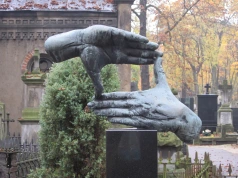• LSO Szymanowski: Programme Essay
 Programme Essay
Programme Essay
October 2012-March 2013
Szymanowski the Outsider
When composers are near-contemporaries, their careers and reputations present tempting opportunities for comparison. John Cage was born in 1912, Britten and Lutosławski a year later. Harrison Birtwistle and Peter Maxwell Davies were born in 1934, Penderecki and Górecki a year earlier, within two weeks of each other. Yet arguably the most intriguing set of contemporaries includes Bartók (1881), Stravinsky and Szymanowski (1882), and Webern (1883).
Webern remains the one with the lowest profile in the concert hall, yet his reputation is high because of his radicality. Bartók and Stravinsky have maintained a central place in the pantheon of twentieth-century music. Yet neither in Szymanowski’s lifetime nor during the decades following his death in 1937 was his music part of the generally accepted canon of early twentieth-century music. For Poles this has always been a puzzle. They regard him as their most significant composer after Chopin. It is a truism which has still to be fully explored that some composers’ music has not ‘travelled’. It would be interesting, for example, to learn how highly regarded the music of Elgar was beyond these shores both during and after his lifetime.
Circumstances undoubtedly play their part. Szymanowski’s cultural situation cannot be separated from the fate of his country, which was under occupying powers until he was in his late 30s, including the trauma of The Great War. Polish musical life was also in the doldrums during these years; the first professional orchestra in Poland was not founded until 1901. Szymanowski had to battle to be heard, to discover what was going on in Berlin, Vienna or Paris. He was both culturally and personally an outsider.
It is sometimes argued that he was a chameleon, someone who shifted his stylistic focus too readily, that he was, to use that unnecessarily derogatory word, eclectic. This is a non-argument, as a brief glance at the careers and music of Bartók and, more particularly, Stravinsky reveals. Consistency is a valued commodity, but consistency of character outlasts shifts in style. Szymanowski’s three stylistic periods, crudely summarised as Austro-German, Franco-Arabic and Polish, may appear wildly varied, but his artistic vision remained constant and his alchemic powers unsurpassed. Thus it is, for example, that the intense lyricism of the Concert Overture and Second Symphony in his first period is heightened in the First Violin Concerto in the middle period and transmuted into something earthier in the Second Violin Concerto in the late period. His ‘voice’ is unmistakeable across his career.
Where perhaps Szymanowski’s star did not shine so brightly in Europe and North America was in his less obvious radicality or, to use a more recent term, avant-gardism. But dig beneath the surface and there you will find an astonishingly acute imagination at work, not only in harmonic ideas and textural precision but also in his unfailing rethinking of the musculature of musical structures. This is where Szymanowski approaches Debussy’s creative processes.
Szymanowski’s own view of his place in the world reinforces the impression of the outsider, of someone who found inspiration in the exotic, in the ‘other’. How great a part his sexuality played in this is open to debate, but he was more concerned with what he once called ‘My Splendid Isolation’. This article from 1922 was a bitter commentary on Polish critics who not only decried his music but also that of Debussy, Ravel and Stravinsky. Szymanowski’s musical writings (mostly from the 1920s) make fascinating reading, charting his volte-face against Austro-German hegemony, his worship of Chopin as the de facto leader of an alternative European musical culture from both East and West of Poland, and ultimately his passion for the indigenous music of his native Poland, which was establishing its own identity after over 120 years of occupation by Russia, Prussia and Austria.
Curiously, not least in the context of this innovative series of LSO concerts, Szymanowski maintained a fondness and respect for Brahms. In 1912, he wrote: ‘I’d rather a single bar of Brahms than the whole of modern French music, which is too superficial’. He soon changed his opinion on this latter front, but he subsequently thought of Brahms as a ‘noble, solitary figure’, perhaps sensing a parallel with his own position.
As the LSO marks the 75th anniversary of Szymanowski’s death in 1937, today’s audiences are much better aware of his music. The upsurge in performances and recordings outside Poland began back in the mid-1970s, with the Sadler’s Wells production of his opera King Roger. This was followed by reissues on LP, then CD, of archive Polish recordings and a real boost came when Sir Simon Rattle championed his music with the CBSO. Most of Szymanowski’s music has since become widely available, sometimes in multiple recordings. But nothing can beat the live experience, especially when played by the LSO under Valery Gergiev.
© 2012 Adrian Thomas
